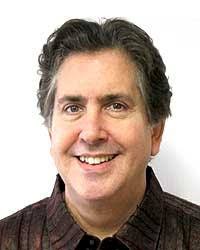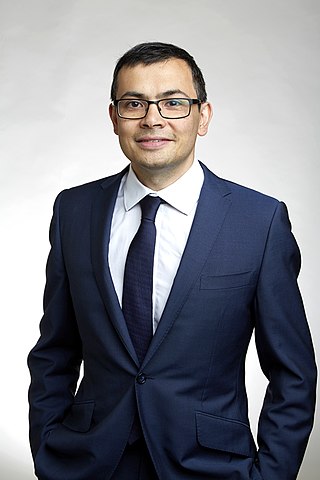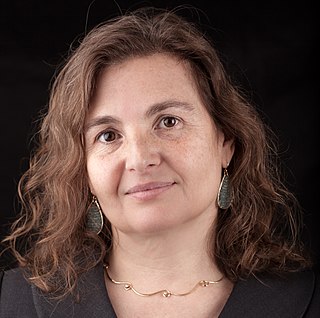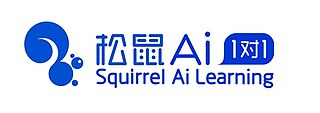Related Research Articles

Marvin Lee Minsky was an American cognitive and computer scientist concerned largely with research of artificial intelligence (AI). He co-founded the Massachusetts Institute of Technology's AI laboratory and wrote several texts concerning AI and philosophy.

Douglas Bruce Lenat was an American computer scientist and researcher in artificial intelligence who was the founder and CEO of Cycorp, Inc. in Austin, Texas.

Computer Science and Artificial Intelligence Laboratory (CSAIL) is a research institute at the Massachusetts Institute of Technology (MIT) formed by the 2003 merger of the Laboratory for Computer Science (LCS) and the Artificial Intelligence Laboratory. Housed within the Ray and Maria Stata Center, CSAIL is the largest on-campus laboratory as measured by research scope and membership. It is part of the Schwarzman College of Computing but is also overseen by the MIT Vice President of Research.

Daphne Koller is an Israeli-American computer scientist. She was a professor in the department of computer science at Stanford University and a MacArthur Foundation fellowship recipient. She is one of the founders of Coursera, an online education platform. Her general research area is artificial intelligence and its applications in the biomedical sciences. Koller was featured in a 2004 article by MIT Technology Review titled "10 Emerging Technologies That Will Change Your World" concerning the topic of Bayesian machine learning.

Demis Hassabis is a British computer scientist, artificial intelligence researcher and entrepreneur. In his early career he was a video game AI programmer and designer, and an expert board games player. He is the chief executive officer and co-founder of DeepMind and Isomorphic Labs, and a UK Government AI Advisor. He is a Fellow of the Royal Society, and has won many prestigious awards for his work on AlphaFold including the Breakthrough Prize, the Canada Gairdner International Award, and the Lasker Award. In 2017 he was appointed a CBE and listed in the Time 100 most influential people list.

James Joseph Collins is an American biomedical engineer and bioengineer who serves as the Termeer Professor of Medical Engineering & Science at the Massachusetts Institute of Technology (MIT), where he is also a director at the MIT Abdul Latif Jameel Clinic for Machine Learning in Health.

Daniela L. Rus is a roboticist and computer scientist, Director of the MIT Computer Science and Artificial Intelligence Laboratory (CSAIL), and the Andrew and Erna Viterbi Professor in the Department of Electrical Engineering and Computer Science (EECS) at the Massachusetts Institute of Technology. She is the author of the books Computing the Future and The Heart and the Chip.

Andrew Yan-Tak Ng is a British-American computer scientist and technology entrepreneur focusing on machine learning and artificial intelligence (AI). Ng was a cofounder and head of Google Brain and was the former Chief Scientist at Baidu, building the company's Artificial Intelligence Group into a team of several thousand people.
Joshua Brett Tenenbaum is Professor of Computational Cognitive Science at the Massachusetts Institute of Technology. He is known for contributions to mathematical psychology and Bayesian cognitive science. According to the MacArthur Foundation, which named him a MacArthur Fellow in 2019, "Tenenbaum is one of the first to develop and apply probabilistic and statistical modeling to the study of human learning, reasoning, and perception, and to show how these models can explain a fundamental challenge of cognition: how our minds understand so much from so little, so quickly."
Amy Nadya Finkelstein is an American economist who is a professor of economics at the Massachusetts Institute of Technology (MIT), the co-director and research associate of the Public Economics Program at the National Bureau of Economic Research, and the co-Scientific Director of J-PAL North America. She was awarded the 2012 John Bates Clark Medal for her contributions to economics. She was elected to the National Academy of Sciences and won a MacArthur "Genius" fellowship in 2018.

Dina Katabi, born 1970, is the Andrew and Erna Viterbi Professor of Electrical Engineering and Computer Science at MIT and the director of the MIT Wireless Center. She was designated as one of the world’s most influential women engineers by Forbes magazine.

Fei-Fei Li is a China-born American computer scientist, known for establishing ImageNet, the dataset that enabled rapid advances in computer vision in the 2010s. She is Sequoia Capital professor of computer science at Stanford University and former board director at Twitter. Li is a co-director of the Stanford Institute for Human-Centered Artificial Intelligence and a co-director of the Stanford Vision and Learning Lab. She served as the director of the Stanford Artificial Intelligence Laboratory from 2013 to 2018.

Anantha P. Chandrakasan is the Chief Innovation and Strategy Officer, the dean of the School of Engineering, and Vannevar Bush Professor of Electrical Engineering and Computer Science at Massachusetts Institute of Technology. He is chair of the MIT Climate and Sustainability Consortium and MIT AI Hardware Program, and co-chair the MIT–IBM Watson AI Lab, the MIT–Takeda Program, and the MIT and Accenture Convergence Initiative for Industry and Technology.

Cynthia Diane Rudin is an American computer scientist and statistician specializing in machine learning and known for her work in interpretable machine learning. She is the director of the Interpretable Machine Learning Lab at Duke University, where she is a professor of computer science, electrical and computer engineering, statistical science, and biostatistics and bioinformatics. In 2022, she won the Squirrel AI Award for Artificial Intelligence for the Benefit of Humanity from the Association for the Advancement of Artificial Intelligence (AAAI) for her work on the importance of transparency for AI systems in high-risk domains.
Olga Russakovsky is an associate professor of computer science at Princeton University. Her research investigates computer vision and machine learning. She was one of the leaders of the ImageNet Large Scale Visual Recognition challenge and has been recognised by MIT Technology Review as one of the world's top young innovators.

Squirrel AI is a Chinese online education technology company that specializes in intelligent adaptive education. It is one of the first companies offering large scale AI-powered adaptive education solutions in China.

Halicin (SU-3327) is an experimental drug that acts as an enzyme inhibitor of c-Jun N-terminal kinase (JNK). Originally, it was researched for the treatment of diabetes, but development was discontinued for this application due to poor results in testing. In 2019, this molecule was found by an artificial intelligence (AI) model to show antibiotic properties against a number of bacteria.

Michael Bronstein is an Israeli computer scientist and entrepreneur. He is a computer science professor at the University of Oxford.
The MIT Abdul Latif Jameel Clinic for Machine Learning in Health is a research center at the Massachusetts Institute of Technology (MIT) in the field of artificial intelligence (AI) and health sciences, including disease detection, drug discovery, and the development of medical devices. The MIT Jameel Clinic also supports the commercialization of solutions through grant funding, and has partnered with pharmaceutical companies, like Takeda and Sanofi, and philanthropies, like Community Jameel and Wellcome Trust, to forge collaborations between research and development functions and MIT researchers.
The AAAI Award for Artificial Intelligence for the Benefit of Humanity is an annual prize given by the Association for the Advancement of Artificial Intelligence to recognize the positive impacts of AI to meaningfully improve, protect, and enhance human life. The award is presented annually at the AAAI conference in February. In its first two years, the associated reward was US$1 million, but has since been changed to $25000. Funding is provided by the Chinese online education company Squirrel AI.
References
- 1 2 Auslender, Viki (17 April 2020). "Hitting the Reset Button on Antibiotics". CTECH - www.calcalistech.com.
- ↑ "CAREER: Content and Cohesion Models, with Applications to Text Summarization and Natural Language Generation".
- ↑ "Regina Barzilay, 34 / Teaching computers to read and write" . Retrieved 2017-11-21.
- ↑ "Regina Barzilay" . Retrieved 2017-11-21.
- 1 2 "Regina Barzilay, Computer Science PhD '03, Wins MacArthur "Genius" Grant". 8 November 2017. Retrieved 2017-11-21.
- ↑ "Regina Barzilay, a BGU CS Alumna and an MIT Professor, wins MacArthur "genius grant"". Ben-Gurion University Dept. of Computer Science. Retrieved 24 September 2020.
- ↑ "'Genius grants' to Israeli computer linguist, opera kingpin with Israeli parents". Times of Israel.
- ↑ "Regina Barzilay named Delta Electronics Professor". MIT News. Retrieved 2017-11-23.
- ↑ "MIT Professor, MacArthur Genius Fellow, Uses Computer Learning To Predict Cancer Risks". WBUR. Retrieved 2017-11-21.
- 1 2 "Regina Barzilay" . Retrieved 2017-11-21.
- ↑ "The Push for News Returns". WIRED. Retrieved 2017-11-21.
- ↑ "Putting data in the hands of doctors". MIT News. Retrieved 2017-11-21.
- ↑ "Regina Barzilay, James Collins, and Phil Sharp join leadership of new effort on machine learning in health". MIT News | Massachusetts Institute of Technology. 3 October 2018. Retrieved 2020-11-13.
- ↑ "People". J-Clinic. Retrieved 2020-11-13.
- ↑ Stokes, Jonathan M.; Yang, Kevin; Swanson, Kyle; Jin, Wengong; Cubillos-Ruiz, Andres; Donghia, Nina M.; MacNair, Craig R.; French, Shawn; Carfrae, Lindsey A.; Bloom-Ackermann, Zohar; Tran, Victoria M. (20 February 2020). "A Deep Learning Approach to Antibiotic Discovery". Cell. 180 (4): 688–702.e13. doi: 10.1016/j.cell.2020.01.021 . ISSN 1097-4172. PMC 8349178 . PMID 32084340.
- ↑ "Artificial Intelligence Yields New Antibiotic". The MIT Campaign for a Better World. Retrieved 2020-11-13.
- ↑ Marchant, Jo (2020-02-20). "Powerful antibiotics discovered using AI". Nature. doi:10.1038/d41586-020-00018-3. PMID 33603175. S2CID 214135545.
- ↑ "Jim Collins receives funding to harness AI for drug discovery". MIT News | Massachusetts Institute of Technology. 23 April 2020. Retrieved 2020-11-13.
- ↑ Plato, Republished by (22 April 2020). "짐 콜린스, 약물 발견을 위해 AI를 활용하기위한 자금 지원 |" (in Korean). Retrieved 2020-11-13.
- 1 2 3 "Regina Barzilay". people.csail.mit.edu. Retrieved 2017-11-23.
- ↑ "Regina Barzilay wins $1M Association for the Advancement of Artificial Intelligence Squirrel AI award". news.mit.edu. 23 September 2020. Retrieved 2020-09-23.
- ↑ "National Academy of Medicine Elects 100 New Members". National Academy of Medicine. 9 October 2023. Retrieved 9 October 2023.
- ↑ "National Academy of Engineering Elects 106 Members and 18 International Members". National Academy of Engineering. 7 February 2023. Retrieved 22 March 2024.